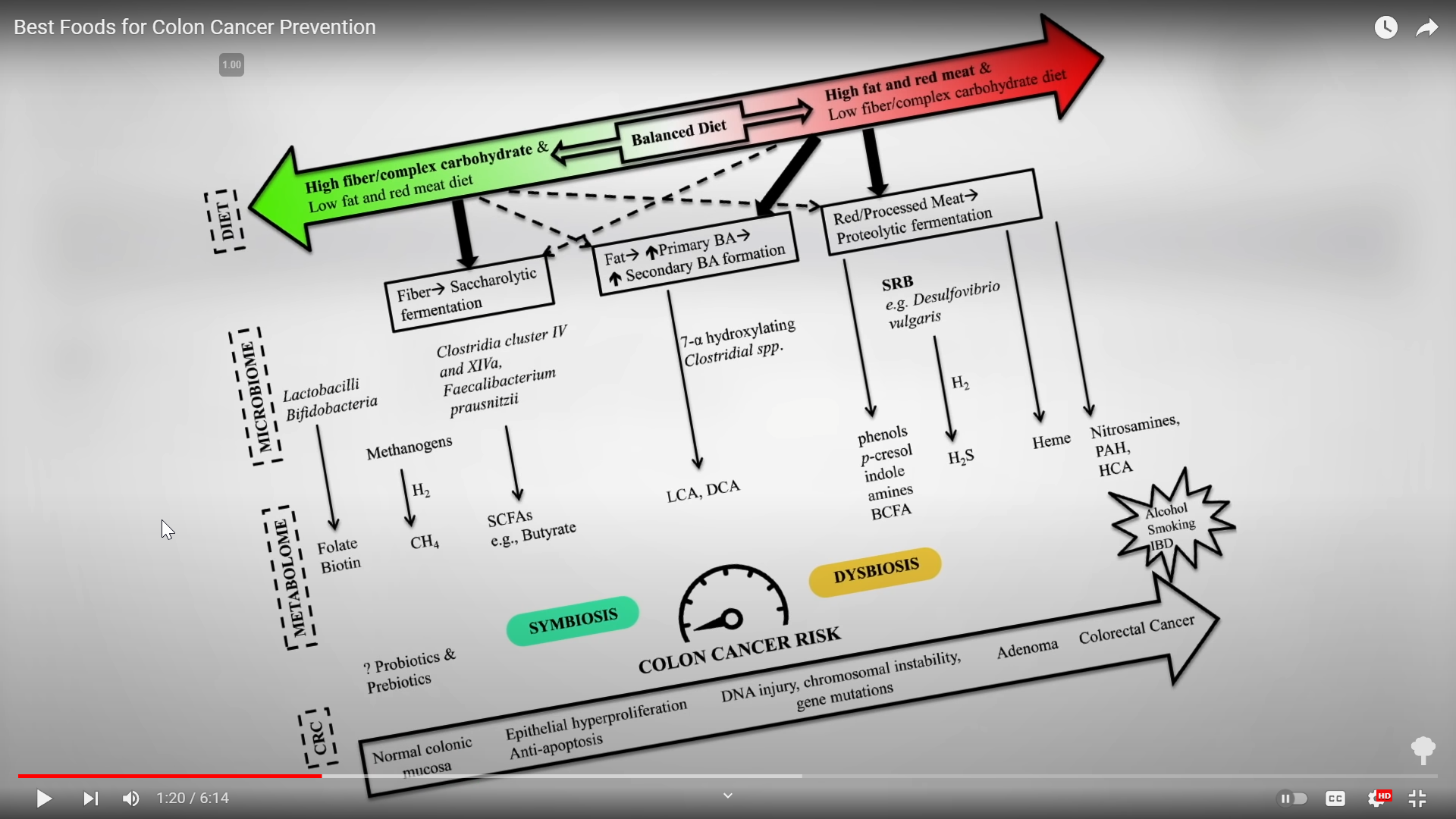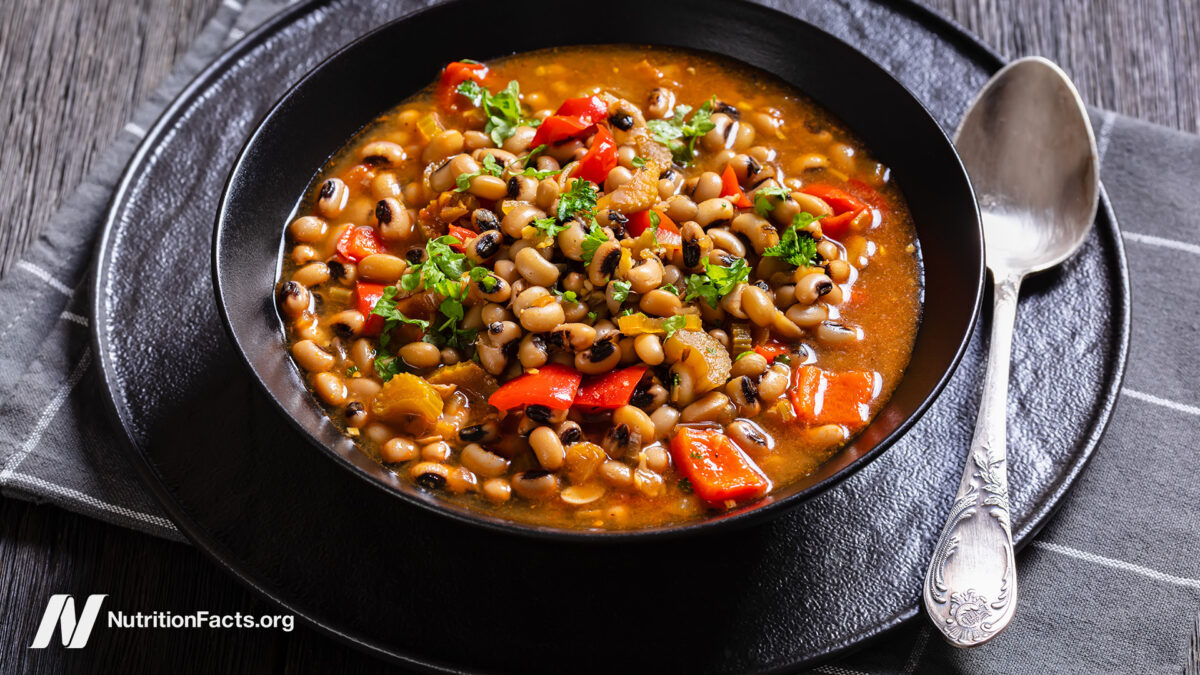A low-fiber diet is a key driver of microbiome depletion, the disappearance of diversity in our good gut flora.
We have a hundred trillion microorganisms residing in our gut, give or take a few trillion, but the “spread of the Western lifestyle has been accompanied by microbial changes,” which may be contributing to our epidemics of chronic disease. The problem is that we’re eating meat-sweet diets, “characterized by a high intake of animal products and sugars, the use of preservatives, and a low intake of plant-based foods, such as fruits, vegetables, and whole grain cereals.”
Contrary to the fermentation of the carbohydrates that make it down to our colon, where the fiber and resistant starch benefit us through the generation of magical short-chain fatty acids like butyrate, when excess protein is consumed, “microbial protein fermentation generates potentially toxic and pro-carcinogenic metabolites involved in CRC,” colorectal cancer. So, what we eat can cause an imbalance in our gut microbiome and potentially create “a ‘recipe’ for colorectal cancer,” where a high-fat, high-meat, high-processed food diet tips the scale towards dysbiosis and colorectal cancer, as you can see below and at 1:04 in my video Best Foods for Colon Cancer Prevention. On the other hand, a high-fiber and starch, lower-meat diet can pull you back into symbiosis with your friendly flora and away from cancer.

“Evidence from recent dietary intervention studies suggest adopting a plant-based, minimally processed high-fiber diet may rapidly reverse the effects of meat-based diets on the gut microbiome.” So, what may be “a new form of personalized (gut microbiome) medicine for chronic diseases”? It’s called food, which can “rapidly and reproducibly” alter the human gut microbiome. As shown in the graph below and at 1:52 in my video, if you switch people between a whole food, plant-based diet to more of an animal-based diet, you can see dramatic shifts within two days, resulting in toxic metabolites.

And, after switching to an animal-based diet, levels go up of deoxycholic acid, a secondary bile acid known to promote DNA damage and liver cancers. Why do levels go up? Because the bad bacteria that produce it triple in just two days, as you can see in the graph below and at 2:10 in my video.

Over time, the richness of the microbial diversity in our gut has been disappearing. Below and at 2:22 in my video, you can see a graphic of our bacterial tree of life and how it’s being depleted. Why is this happening? It is because of “The Fiber Gap.” “A low-fiber diet is a key driver of microbiome depletion.” Sure, there are factors like antibiotics, cesarean sections, and indoor plumbing that have contributed to the gut microbiome diversity decline, but “the only factor that has been empirically shown to be important is a diet low in microbiota-accessible carbohydrates (MACs),” not Big Macs. That’s just a fancy name for fiber found in whole plant foods and resistant starch found mostly in beans, peas, lentils, and whole grains.

Our intake of dietary fiber and whole plant foods “is negligibly low in the Western world” when compared to what we evolved to eat over millions of years. “Such a low-fiber diet provides insufficient nutrients for the gut microbes,” which leads not only to the loss of bacterial diversity and richness but also to a reduction in the production of those beneficial fermentation end products that they make with the fiber. We are, in effect, “starving our microbial self.”
What are we going to do about the “deleterious consequences” of a diet deficient in whole plant foods? Create new-fangled “functional foods,” of course, and supplements and drugs—prebiotics, probiotics, synbiotics. Think how much money there is to be made! Or, we can just eat the way our bodies were meant to eat, but what kind of value is that going to earn your stockholders? Don’t you know probiotic pills may be “the next big source of income” for Big Pharma?
Why eat healthfully when you can just have someone else eat healthfully for you, then get a fecal transplant from a vegan? Researchers compared the microbiomes of vegans versus omnivores and found the vegans’ friendly flora were churning out more of the good stuff, showing that a plant-based diet may result in more beneficial metabolites in the bloodstream and less of the bad stuff like TMAO. But while the impact of a vegan diet on what the bacteria were making was large, “its effect on the composition of the gut microbiome [was] surprisingly modest.” The researchers only found “slight differences between the gut microbiota of omnivores and vegans.” Really? “The very modest difference between the gut microbiota of omnivores relative to vegans juxtaposed to the significantly enhanced dietary consumption of fermentable plant-based foods” was a shocker to the researchers. The vegans were eating nearly twice the fiber. Can anyone guess the problem here? The vegans just barely made the minimum daily intake of fiber. Why? Because Oreos are vegan. Cocoa Pebbles are vegan. French fries, Coke, potato chips. There are vegan Doritos and Pop-Tarts. You can eat a terrible vegan diet.
Burkitt showed that we need to get at least 50 grams of fiber a day to prevent colon cancer, and that’s only half of what our bodies were designed to get. We evolved getting about 100 grams a day, which is the amount you see in modern populations immune to epidemic colorectal cancer. So, instead of feeding people a vegan diet, what if you just fed people that kind of diet, one centered around whole plant foods? For an answer to that, check out my video The Best Diet for Colon Cancer Prevention.
